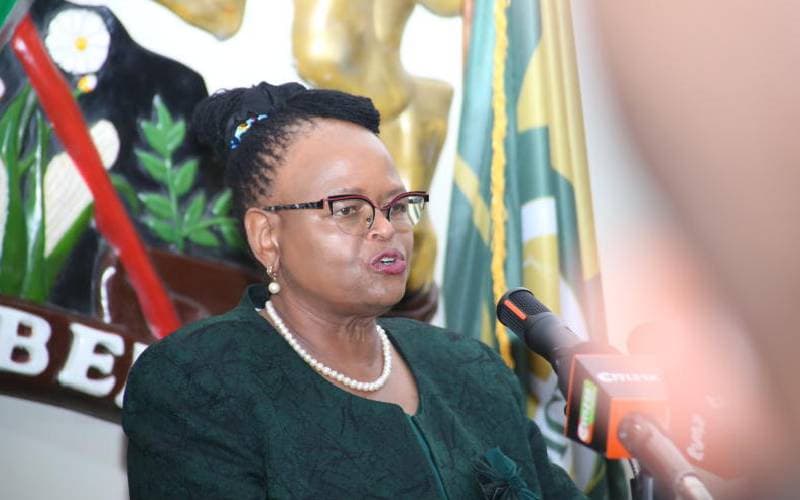We're loading the full news article for you. This includes the article content, images, author information, and related articles.
A three-judge bench has dismissed claims of bias and lack of expertise, ruling they will continue to hear petitions seeking the removal of the Chief Justice and other Supreme Court judges, setting the stage for a significant legal battle over the judiciary's top leadership.

A three-judge High Court bench on Friday, November 14, 2025, dismissed an application seeking their recusal from hearing seven consolidated petitions aimed at removing Chief Justice Martha Koome and other Supreme Court judges from office. The ruling, delivered at the Milimani Law Courts in Nairobi, rejected claims of bias and questionable expertise, allowing the substantive case against the country's top judicial officers to proceed.
The bench, comprising Justices Charles Kariuki, Lawrence Mugambi, and Bahati Mwamuye, declared the recusal application lodged by petitioners, including former Law Society of Kenya (LSK) President Nelson Havi, to be without merit. "The application seeking our recusal and referring the case back to the Chief Justice to empanel a new bench lacks merit and is hereby dismissed," the judges ruled, stating that the applicants failed to provide substantiated grounds for their request.
The petitioners had fundamentally challenged the composition of the bench, which was appointed by Chief Justice Koome herself—a primary subject of the removal petitions. Mr. Havi and his fellow applicants argued this created a direct conflict of interest. They contended that Justice Koome should have delegated the responsibility of empaneling the bench to Deputy Chief Justice Philomena Mwilu to ensure impartiality.
The application further alleged potential bias and questioned the suitability of Justices Mugambi and Mwamuye, who were sworn in in 2022 and 2024, respectively. The petitioners claimed these judges were too junior and lacked the requisite expertise to handle the "weighty legal issues" involved in the potential removal of the entire Supreme Court bench. Another argument posited that because these judges were vetted by the Judicial Service Commission (JSC), chaired by Justice Koome, their independence could be compromised.
In their comprehensive ruling, the judges systematically dismantled the petitioners' arguments. They affirmed the constitutional principle that all High Court judges possess equal status and competence, regardless of their length of service. "We emphasise constitutional principles, that all High Court judges enjoy equal status and competence," the bench observed, stressing that seniority does not determine a judge's capacity to adjudicate a matter.
Crucially, the court found no evidence had been presented to support the fears of a biased or prejudiced decision. The judges rejected the allegations against Justices Mugambi and Mwamuye's independence as unsubstantiated.
Citing a Court of Appeal decision in a case involving Deputy President Rigathi Gachagua, the bench reiterated that the authority to empanel judges for constitutional matters is exclusively vested in the Chief Justice. They also noted that the issue of the bench's formation had already been decided and was therefore "functus officio," meaning it could not be reopened before the High Court.
This ruling has significant implications for the Kenyan judiciary, reinforcing the Chief Justice's administrative powers and setting a high bar for future applications seeking the recusal of judges. The principle of judicial recusal is a cornerstone of a fair legal system, designed to prevent conflicts of interest and ensure that justice is not only done but is seen to be done. However, courts are also wary of recusal applications being used as a tactic to delay proceedings or for "judge shopping."
The Kenyan Judicial Service (Code of Conduct and Ethics) Regulations, 2020, mandate recusal where a judge's impartiality might reasonably be questioned. The test is objective: whether a fair-minded and informed observer would conclude there was a real possibility of bias. In this instance, the High Court concluded that this threshold was not met.
With the dismissal of the recusal application, the path is now clear for the main hearing of the seven petitions, which challenge the JSC's handling of the removal petitions against the Supreme Court judges. The court has scheduled the substantive hearing to begin on February 26 of the following year and directed the affected judges to file their affidavits within 14 days.
Keep the conversation in one place—threads here stay linked to the story and in the forums.
Sign in to start a discussion
Start a conversation about this story and keep it linked here.
Other hot threads
E-sports and Gaming Community in Kenya
Active 9 months ago
The Role of Technology in Modern Agriculture (AgriTech)
Active 9 months ago
Popular Recreational Activities Across Counties
Active 9 months ago
Investing in Youth Sports Development Programs
Active 9 months ago
Key figures and persons of interest featured in this article